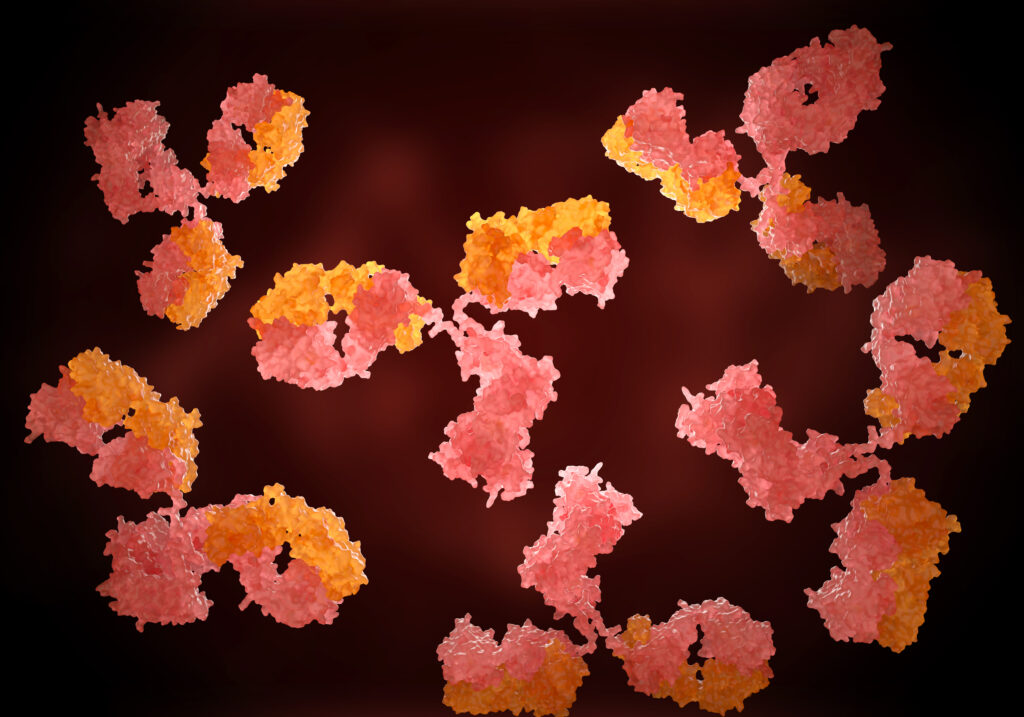Roche’s T-cell engaging bispecific immunotherapy Columvi (glofitamab-gxbm) received accelerated approval from the US Food and Drug Administration (FDA) last week for the treatment of adult patients with relapsed or refractory diffuse large B-cell lymphoma (DLBCL) or large B-cell lymphoma (LBCL) arising from follicular lymphoma who have received two or more prior lines of systemic therapy.
The approval makes Columvi the second bispecific approved for DLBCL. The approval came less than a month after AbbVie and Genmab’s Epkinly (epcoritamab) got the FDA green light to make it the first bispecific for the indication. Both treatments are CD20xCD3 bispecific T-cell engagers, making them direct competitors in the growing lymphoma bispecific arena.
DLBCL is an aggressive, difficult to treat and most common form of non-Hodgkin lymphoma in the US. While many DLBCL patients respond to conventional treatments, about 40 percent will relapse or have refractory disease and subsequent treatments for them have poor outcomes.
Columvi is a bispecific antibody designed to bind to CD3 on the surface of T cells and CD20 on the surface of B cells in a novel 1:2 structural format where one region of the antibody binds to CD3 and two to CD20.
Columvi is Roche’s second CD20xCD3 T-cell engager to enter the market after the company’s Lunsumio was first approved as a third-line therapy for follicular lymphoma in December 2022.
Related: Epkinly (Epcoritamab) Approved as First Bispecific Antibody for Most Common Non-Hodgkin’s Lymphoma
Both Lunsumio and Columvi have a fixed duration of treatment. A defined treatment duration contrasts with treat-to-progression approaches where treatment is administered indefinitely until the cancer progresses or the therapy cannot be tolerated, whichever occurs first.
Columvi has a fixed treatment duration of 8.5 months, offering patients a target end date for their course of treatment and the possibility of a treatment-free period. This gives Columvi an edge over AbbVie’s Epkinly, which is not given as a fixed-term treatment. On the other hand, Epkinly has a more convenient route of administration as it is given under the skin whereas Columvi is administered as an intravenous injection.
“People with diffuse large B-cell lymphoma who have gone through multiple lines of therapy have a poor prognosis and desperately need additional treatment options,” said Levi Garraway, Roche’s chief medical officer and head of global product development in a press release from the company. “As an off-the-shelf, fixed-duration treatment providing durable response rates, we believe Columvi could change the way this aggressive lymphoma is treated, reinforcing our dedication to bringing innovative treatment options to people with critical unmet needs.”
XTALKS WEBINAR: Innovating Oncology Trials: Breaking Access Barriers, Optimizing Protocols and Navigating Regulatory Challenges
Live and On-Demand: Tuesday, July 11, 2023, at 10am EDT (4pm CEST/EU-Central)
Register for this free webinar on innovation in oncology trials to gain valuable insights optimizing trial design, into overcoming barriers and adhering to the evolving regulatory landscape. Ultimately, this knowledge will contribute to equitable access to innovative treatments, improved trial efficiency and enhanced patient outcomes.
Columvi’s approval was based on results from a pivotal Phase I/II NP30179 study of Columvi given as a fixed course for 8.5 months in 132 patients with DLBCL who had relapsed or were refractory to prior therapies. Previous treatments included about one-third who had received CAR T-cell therapy.
Patients treated with Columvi achieved durable remission, 43 percent of patients achieving a complete response (CR) and 56 percent achieving an overall response (OR; OR is the CR rate and partial response rate). Over two-thirds of those who responded continued to respond for at least nine months, and the median duration of response was 1.5 years.
Moreover, according to updated data presented at the American Society of Clinical Oncology (ASCO) this month, 68 percent of patients remained in complete remission at 18 months. This is promising as responses remain durable even after patients stop treatment after 8.5 months; however, the investigators said a longer follow-up after the end of treatment is required.
Looking at how Epkinly measures up against Columvi, AbbVie’s drug demonstrated a 61 percent overall response rate in its trial of 148 patients with 38 percent of patients who had a CR. The median duration of response was 15.6 months. Of note, Epkinly’s study had more patients who had previously tried a CAR-T therapy compared to the Columvi study.
As immunotherapies, both treatments can cause cytokine release syndrome (CRS) as a side effect. Columvi had a CRS rate of 70 percent, including 4.1 percent at grade 3 or 4, and Epkinly had a CRS rate of 51 percent in its own trial, including 2.5 percent at grade 3.
Patients who receive Columvi are given a corticosteroid, a fever-reducing medication and an antihistamine as premedications to reduce the risk of CRS.
As part of the accelerated approval, Roche will have to conduct confirmatory trials for Columvi.
Roche revealed it has an ongoing clinical development program for Columvi to investigate it as a monotherapy and in combination with other drugs for the treatment of B-cell non-Hodgkin lymphomas, including DLBCL and other blood cancers.












Join or login to leave a comment
JOIN LOGIN